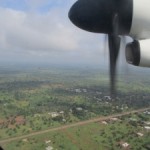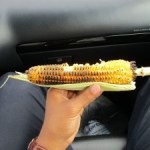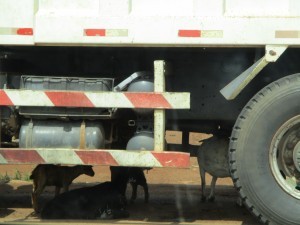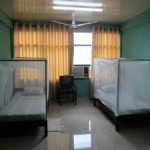So. Many. Goats.
Of all the possible observations I could have used to sum up the first week of my stay in rural northern Ghana, I had to choose one as silly as this. Aside from trying my hand at humor, this title is a reflection of what made me realize that the West African countryside will be my home for the next couple of months. Before I talk about my new home and favorite animal, though, let’s start from the top. I left home — Medford, MA — on September 1, the day before my mom’s birthday (sorry mom…). On my way to the airport, it still hadn’t occurred to me that this was happening. It felt like any other start to the fall semester: Getting a ride to the airport, talking about all the things I have planned when I return to the Hilltop, and looking forward to rendezvousing with my friends. It wasn’t until I had my visa checked by one of the employees at Logan International Airport that I realized I was not in fact returning to John Carroll’s humble abode for the fall (other than a quick visit between flights). Still, reality hadn’t fully settled in.
After a six and a half hour layover — where I left Dulles to visit campus and my peoples one last time — I found myself on a South African Airlines flight to Accra. A couple airline-sized glasses of SAA’s red, good conversation with a lovely grandmother from Jo-berg and ten hours later, I found myself on African soil (read: tarmac) for the first time in my life.
Despite this hallmark experience, I wasn’t awash with the awe and thrill of being somewhere new like I think most would’ve been. In fact, while traveling through downtown Accra I couldn’t help but think of this place as being familiar. Perhaps all the images of the city I looked up on Google
spoiled the surprise or my city-boy background makes me indifferent to concrete of any nationality. In the end, I think that was for the best. Aileen, Ingrid, and I still had an hour flight and a two hour drive to Navrongo, our real home in Ghana.
The next morning, we flew out from Accra to Tamale (pronounced: ta-ma-LAY, not like the pepper), the northernmost airport.
In reality, it isn’t all that north as we still had our drive ahead of us. Fortunately for us, we were accompanied by Maxwell — our friendly driver from the Center who introduced us to Ghanaian style corn and asked us plenty of questions about U.S. politics that left me a bit stumped — and some amazing scenery.
Rather than being met by buildings and traffic, the three of us were greeted by green fields on either side, small roadside shops and, most importantly, goats. Lots and lots of goats. Goats lying down. Goats standing. Goats tethered. (Many) Goats running about. Perhaps it’s due to never seeing so many at one time or that everything I had seen at that point had finally caught up to me. Whatever the reason may be, witnessing the omnipresence of these little guys finally made me realize that for the next 15 weeks, the Ghanaian countryside will be my new home.
Given that Dr. Williams, our preceptor, was absent due to a meeting in Accra and with the three of us arriving close to the weekend, our first few days and weekend were used as an adjustment period. To be honest, the living conditions are better here than I had imagined. Prior to all the pre-departure questions and concerns from family and friends, I’d say that I was confident about what I was getting myself into.
Alas, this confidence was not immune to the trepidations of people back home and I went in expecting, well, a Peace Corp-esq environment filled with powerless nights and bucket baths. Needless to say, that is absolutely not the case here in Navrongo; I would even go as far to say that the standards here aren’t much greater or lesser than those of a dorm in Copley.
Of course, there are plenty of things that a Hoya must adjust to: there are random but very infrequent blackouts, one’s shirt becoming soaked with sweat upon walking out the door and the variety of food at the market being limited to the pick-of-the-day. Even sleeping under a bed net, something that doesn’t impede you in anyway, was a weird phenomenon at first. Still, I’m happy to say that my parents’ worst fears were nothing but natural parental concern.
With Dr. Williams out of town and Markus not around for a little while, we’ve had a slower start to our research than typical. In our preceptor’s absence, Thompson — one of the administrators — took us on a tour of the compound, introducing us to everyone (i.e. 150+) people along the way. In addition to showing us where everyone and everything is, Thompson used the opportunity to explain a little about each of the eight ongoing projects. From a comprehensive health demographic survey of the entire area (160,000+ residents) conducted every 4 months to bench work with the goal of finding a genetic predisposition of Africans to metabolic diseases, the Navrongo Health Research Center doesn’t seem to leave a stone unturned when it comes to health.
For this week and next, the four of us are being rotated through each project in order to get more familiar with the tasks at hand. So far, I have sat in on the Preventing Maternal and Neonate Deaths in Northern Ghana (PREMAND) and Northern Health Demographic Surveillance System (NHDSS) projects. Two recurring topics that have caught my eye are socioeconomic status and enrollment in the Ghanaian Health Insurance Scheme. As such, I think I want to focus my research on a potential relationship between these two areas, as I think I am primarily interested in the policy and economic side of global and general health. Exploring this connection will either be a confirmation of my interests or make me realize that I need to find one of the other thousands of areas of health to focus on. Either way, I look forward to my meeting with Dr. Williams this Friday to propose the idea and get the gears turning.
As of the moment, I think I want to focus my health systems paper on either the improvements in sanitation or malaria prevention and eradication. In reality though, I have no idea how to tackle this assignment. I’m pretty confident though that shadowing will help me figure out a topic for this paper, hopefully with just enough time to spare.
If all else fails, maybe I can write my paper on goats and their effects on the health system. I promise that I’m not obsessed.
This article was originally published on Medium, at the following link. Alexander O Porte is a senior in the NHS, and is studying abroad in Ghana for the semester. This is the first in a 4-article series.






